Steering Committee
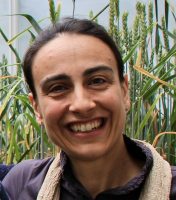
Elizabete Carmo-Silva - Chair
Lancaster University
Elizabete is an expert on the regulation of carbon assimilation by Rubisco in crop plants, especially wheat and cowpea. She leads a research team that aims to understand and improve the efficiency of photosynthesis to optimise the sustainability and climate resilience of crop production. She received her undergraduate degree in applied plant biology at the University of Lisbon, where she went on to earn her PhD researching photosynthesis and photorespiration in C4 grasses. She specialized on the regulation of Rubisco by its molecular chaperone Rubisco activase as a postdoctoral researcher with the USDA-ARS, then started exploring this knowledge for crop improvement as a research scientist at Rothamsted Research. She joined Lancaster University in 2015 to start a research group that focuses on Rubisco regulation in crops.

Rachel Goddard
Limagrain
Rachel studied Genetics at Leeds University, before completing a PhD in cereal pathology at the John Innes Centre in 2015. After her PhD, Rachel worked as a research scientist to identify sources of resistance to fungal pathogens of wheat, before joining the plant breeding company Limagrain in 2021 as a Cereal Pathologist. At Limagrain, she assists in the formulation of new resistance breeding strategies and provides pathology information and support to both breeders and commercial teams.

Joshua Ham
RAGT
Joshua works for RAGT as a Wheat Breeder. His role involves developing new wheat varieties adapted for the UK market and introducing new traits into the breeding programme. Prior to joining RAGT, Joshua completed his MSc in Plant Genetics and Crop Improvement at the John Innes Centre.

Carus John-Bejai
KWS
Carus is the wheat pre-breeder at KWS and is based in the UK. His team’s works aims to identify, and then introduce, desirable allelic variation that is either absent or unrepresented in KWS’ elite wheat breeding pools. This is achieved through intraspecies hybridization, pedigree selection and whole genome SNP fingerprinting. Carus received his Ph.D. in Crop Science from the University of Nottingham in 2018. Prior to this he pursued an MSc in Crop Improvement and a BSc in Biology at the University of Nottingham and the University of the West Indies respectively.

Christophe Lambing
Rothamsted Research
Christophe is the Head of Group of Plant Genetics at Rothamsted Research. He received his PhD at the University of Birmingham before doing a Postdoc in the Department of Plant Sciences at the University of Cambridge where he studied meiosis. In 2021, he set up his independent research group. His two main research areas are on deciphering the molecular mechanisms that control the pattern of meiotic recombination in germ cells and stabilising yield under climate change by increasing thermo-tolerance of the reproductive tissue. His group uses Arabidopsis for fundamental discoveries and translates findings into wheat to accelerate breeding.

Miriam Schreiber
James Hutton Institute
Miriam is a computational biologist at the James Hutton Institute. After her undergraduate at the RWTH Aachen in Germany she moved to Dundee in Scotland for her PhD and stayed on. Her research experience includes all kinds of “Omics” datasets in barley research. Miriam’s latest work as part of the University of Dundee involved the combination of phenotypic, genotypic and expression data in a big association study on spring barley cultivars. At the James Hutton Institute she is working as part of the Information & Computational Sciences Department along multiple research groups, studying the barley pangenomes and pantranscriptomes.
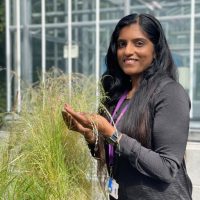
Aiswarya Girija
Aberystwyth University
Dr. Aiswarya Girija is a Strategic Research Fellow at the Institute of Biological, Environmental and Rural Sciences (IBERS) at Aberystwyth University, Wales. Her research focuses on deciphering metabolic pathways and identifying traits that enhance resilience to environmental stresses in crops. With a particular interest in advancing niche cereals like oats and teff, she aims to improve the sustainability and nutritional quality of these crops. Following her Marie Curie Postdoctoral Fellowship in 2023, she joined IBERS to lead research on drought tolerance and seed priming strategies in oats. She is also keen in developing sustainable, nutrient-rich cereal-based food solutions.

Jake Bishop
University of Reading
Jake’s research on crop-environment interactions combines physiology and ecology with the aim of improving agricultural productivity and sustainability in a changing climate. Current projects include diversification to support resilience of UK fruit and vegetable provision, manipulating responses of wheat to combined heat and drought stress, and better-understanding sources of variation in crop yield on-farm. His group uses diverse approaches including experimentation in the field and in controlled environments, mathematical modelling, data-analyses, and evidence synthesis using meta-analysis.
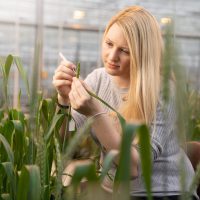
Nikki Walter
University of Nottingham
Nikki is a postdoctoral researcher at University of Nottingham. She completed her PhD in 2024 at the Nottingham Wheat Research Centre within the King’s group, working towards mapping a gametocidal gene in wheat wild relative Aegilops sharonensis. Her current work is focussed on screening free-living bacteria for N-fixation capabilities within cereal crops within the Murchie Group at University of Nottingham. Nikki is passionate about communicating science effectively and building community around early career researchers.

Kostya Kanyuka
NIAB
Kostya is Head of Plant Pathology at Niab, where his research focuses on the mechanisms of virulence in fungal pathogens of wheat, particularly rusts and Septoria tritici blotch, and the genetic basis of host resistance. He aims to translate this knowledge into sustainable disease control strategies. Previously, he was a Senior Scientist at Rothamsted Research, leading projects on resistance to viral and fungal diseases in wheat and barley. He holds a PhD in plant virology and conducted postdoctoral research at the Sainsbury Laboratory in Norwich, where he identified potato genes conferring resistance to viruses and nematodes and developed expertise in plant gene silencing.
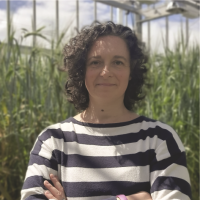
Chiara Campoli
James Hutton Institute
Chiara is a barley geneticist at the James Hutton Institute. During her doctoral and post-doctoral studies, she made use of a variety of genetic resources (natural and induced mutations, available germplasm, mapping populations) to dissect the molecular control of different traits in barley, including cold acclimation and flowering time. More recently, her research focussed on the composition and distribution of the cuticle, a primary line of defence for plants against environmental stresses. Chiara is interested in understanding how variation at the genes controlling cuticle formation impacts barley’s adaptation to different environments and, ultimately, how this knowledge can be utilised for sustainable crop production.
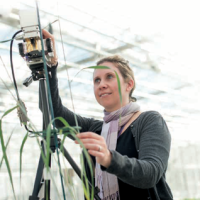
Stella Edwards
University of Nottingham
Stella is a plant physiologist specialising in photosynthesis, with a focus on heat tolerance and crop resilience. She is an Assistant Professor in the Department of Plant and Crop Sciences at the University of Nottingham and a member of the Wheat Research Centre, which develops wheat–wild relative introgressions. Stella holds a degree in Biochemistry and a PhD from the University of Sheffield, where she studied photosynthetic acclimation in rice. She is passionate about crop improvement and climate resilience, working to develop crops that thrive under warmer temperatures and other environmental stresses, and she enjoys seeing how small genetic tweaks can make a big difference.

Nikolai Adamski
John Innes Centre
Nikolai is a wheat geneticist working at the John Innes Centre in Norwich. His work focuses on understanding the genetic programs controlling the development of the wheat inflorescence. To achieve this, Nikolai is using genetic and genomic approaches to study variation in spikelet and floret size and shape within a diverse set of germplasm, including landraces, wheat subspecies, and mutant populations. Nikolai is passionate about training (early career) scientists in using the multitude of available wheat genomics tools for their research. He has participated in several training workshops within the UK and abroad.
